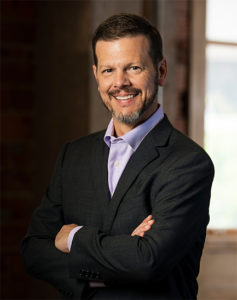Businesses — and modern society as a whole — are living in an “age of disruption” thanks to the twin influences of technological advancement and COVID-19 on a younger workforce, a Tulsa management consultant said Thursday.
The new normal is one of constant change and uncertainty — but that doesn’t have to be scary, Enid native Bill Fournet, founder and CEO of the Persimmon Group, told attendees of Enid Regional Development Alliance’s quarterly luncheon, held virtually via Zoom due to ongoing COVID-19 precautions.
The pandemic hasn’t caused this shift, Fournet said, but has intensified the need for employers to quickly — out of necessity — adjust schedules and embrace alternative, technological work processes to meet what he called its employees’ “human-ness.”
Enid’s unemployment rate has returned to single-digits since before the pandemic, having reached 11.4% in April before falling back to 5.3% in August, according to U.S. Labor of Bureau Statistics.
“Work is not separate from personal anymore — it’s all overlapping,” Fournet said. “Change is happening faster than ever before, and if you keep leading the same way you have been, you’re going to fail.”
Among other recent examples, Fournet pointed to the sudden reported popularity of ride-sharing services such as Lyft and Uber between 2014 and 2018, while competing taxicab companies “buried their heads in the sand,” he said, and refused to adapt to the concept of using one’s cellphone to request a ride that was both cheaper and shorter.
In New York City, in 2014, 37% of passengers were using cabs, and 8% using Lyft/Uber. By 2018, that had more than flipped,
with 70.5% now using ride-sharing apps and 6% using cabs.
Cab companies made one significant change in that time period, Fournet said: paying on a monitor in the backseat with a credit card.
The age of disruption has come as America’s workforce is skewing younger and embracing more technological, personal methods of learning and working.
Millennials, ages 25-34, now make up the largest age group in the workforce, at 39%, with Generation X’ers close behind at 26%.
According to the U.S. Bureau of Labor Statistics, the former generation spends an average 2.9 years in employment. Those from 20 to 24 years old, known as Generation Z, spend 1.3 years on average. By comparison, those 55 and older spend an average 10 years at one job.
A 2018 Gallup survey he cited reported 7 out of 10 of millennials have experienced “burnout” at work.
These two youngest generations look at jobs as a two-way street, Fournet said — millennials grew up being told to “go find your passion,” and Gen Z-ers, who came of age post-recession and post-internet, have the mantra, “We want to change the world.”
“I know that’s hard for some of us to hear … but this youngest generation are very minimalist, and they’re very fast-moving,” Fournet said.
While taking his son, David, to college at Worcester Polytechnic University in Boston, Fornet said he saw a freshman’s family remove from their minivan a vehicle called a “pumpkin carriage” that hovered with propellers, made while the young man was an intern at Google.
But these employees, who learned in an active, collaborative environment, have instead been told to “shut up and color” upon entering the post-academic workforce. “They want development. They want to learn. They believe they have capabilities and want to bring them,” Fournet said. “They will go above and beyond on their own time when afforded that opportunity.”
Fournet encouraged attendees, who represented more than 50 Enid businesses, to prioritize outcome over outputs and to move away from a directive- based, traditional “command and control” work model, which became popular in the aftermath of World War II. To match the increasing speed of change, businesses must instead embrace an outcome-based, newer “establish and empower” model of leadership.
Developing teams of younger employees with this model would ideally reverse this relatively high turnover rate, Fournet told attendees.
“Time is not what we have anymore,” he said.
Fournet, who graduated from Enid High School in 1987, earned a bachelor’s degree from Vanderbilt University and a master’s degree from Oklahoma State University. He has been honored as the Small Business Person of the Year by Tulsa’s Metro Chamber of Commerce and is a two-time honoree for “Most Admired CEO” in Oklahoma.
Fournet currently serves as a member of the board of directors at Boy Scouts of America, Indian Nations. He and his wife, Christy, have three sons.
He is available for questions at bilfournet@ thepersimmongroup.com. His free playbook guide for turning disruption into opportunity is available for download at www.billfournet.com/free.
Article by: Alexander Ewald – Enid News & Eagle
10.2.20
